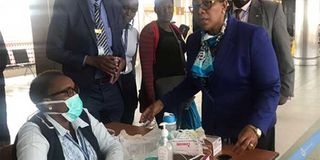Kenya sends special team to its borders after Ebola alert

Health CS Sicily Kariuki (2nd right) at JKIA on June 17, 2019 when she went to assess the Ebola prevention and response measures. She revealed that a special team of health workers has been deployed to the country's points of entry following a suspected case of Ebola virus disease. PHOTO | ELIZABETH MERAB | NATION MEDIA GROUP
What you need to know:
- The team which has been deployed is trained to detect and contain the rare and deadly disease.
- About 30 of the 169 health workers have been deployed to JKIA with the rest being sent to other border points.
- On Friday, WHO, for the third time, declined to declare the Ebola outbreak in the DRC a public health emergency
Kenya’s Ministry of Health has deployed a special team of health workers to the country's points of entry following a suspected case of Ebola virus disease.
The team is trained to detect and contain the rare and deadly disease.
Speaking Monday while touring the Jomo Kenyatta International Airport's (JKIA) port health services, Health Cabinet Secretary Sicily Kariuki said that although no case of Ebola is yet to be detected, health workers are on high alert.
About 30 of the 169 health workers have been deployed to JKIA with the rest being sent to other border points in the country.
WEST AFRICA
The doctors were in 2015 deployed by the Kenyan government to Sierra Leone and Liberia as part of the African Union (AU) mission to contain Ebola in West Africa.
The volunteer health workers, drawn from across the 47 counties, were in West Africa for six months.
"We have also put in place a national Ebola preparedness ad response contingency plan to guide the implementation of prevention and response activities in the event of an outbreak," she said.
WOMAN ISOLATED
The swift response from the ministry comes after a 36-year-old woman exhibiting symptoms similar to those of the haemorrhagic fever was put under quarantine at the Kericho County Referral Hospital.
According to county officials, the woman had travelled from Malaba, a town in Busia County on the border of Kenya and Uganda, to see her spouse.
Three more people have been put in an isolation ward at Kericho Referral Hospital following the Ebola scare.
The husband of the woman who was admitted on Sunday night and two others who assisted him to take her to hospital have been placed in isolation even though they had not shown signs of the disease.
DON'T PANIC
CS Kariuki told Kenyans not to panic and wait for the final conclusive results before jumping into conclusions.
"The Rapid Surveillance and Response Team has examined the patient who is in a stable condition and has confirmed that she does not meet the case definition of Ebola," said Ms Kariuki.
She added that conclusive resulted will be released later Monday after results of the patient's samples that were taken to CDC Kisumu are received.
The Kericho case comes days after two people (a five-year-old boy and 50-year-old grandmother) succumbed the deadly Ebola virus in Uganda while receiving treatment at the Ebola Treatment Unit in Kasese border town.
UGANDA
On Saturday, World Health Organisation (WHO) Director General, Dr Tedros Adhanom Ghebreyesus, visited Uganda and Kasese to assess the situation.
Dr Ghebreyesus commented on the seemingly declining Ebola trends in Butembo and Katwa.
"There appears to be a decline in Butembo and Katwa areas. However, in my discussions with my colleagues, we agreed to be very careful with optimism but very cautious optimism because the Ebola situation in DRC has been very unpredictable with up and down trends," he said.
NO EMERGENCY
Last week on Friday, WHO, for the third time, declined to declare the Ebola outbreak in the Democratic Republic of Congo a public health emergency, though the outbreak spread this week into neighbouring Uganda and ranks as the second deadliest in history.
An expert panel advising the WHO advised against it because the risk of the disease spreading beyond the region remained low and declaring an emergency could have backfired.
"I have accepted the assessment of the WHO Emergency Committee that although the Ebola outbreak in DRC is an emergency in the country and the region, it does not currently constitute a public health emergency of international concern," said Dr Ghebreyesus.






